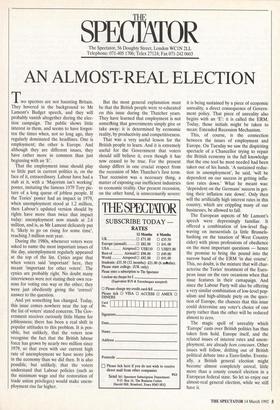THE
SPECTATOR
The Spectator, 56 Doughty Street. London WC1N 2LL Telephone: 071-405 1706; Telex 27124; Fax 071-242 0603
AN ALMOST-REAL ELECTION
Two spectres are not haunting Britain. They hovered in the background to Mr Lamont's Budget speech, and they will
probably vanish altogether during the elec- tion campaign. The public shows little interest in them, and seems to have forgot- ten the times when, not so long ago, they regularly dominated the headlines. One is employment; the other is Europe. And although they are different issues, they have rather more in common than just beginning with an 'E'.
That the employment issue should play so little part in current politics is, on the face of it, extraordinary. Labour have had a stab at it, with a `Majorism isn't working' poster, imitating the famous 1979 Tory pic- ture of a long queue of jobless people. If the Tories' poster had an impact in 1979, when unemployment stood at 1.2 million, then Labour's updated version should by rights have more than twice that impact today: unemployment now stands at 2.6 million, and is, as Mr Lamont delicately put it, 'likely to go on rising for some time', reaching 3 million next year.
During the 1980s, whenever voters were asked to name the most important issues of the day, unemployment regularly appeared at the top of the list. Cynics argue that when voters said 'important' here, they meant 'important for other voters'. The cynics are probably right. No doubt many interviewees were not stating their own rea- sons for voting one way or the other; they were just obediently giving the 'correct' answer to the question.
And yet something has changed. Today, this issue comes nowhere near the top of the list of voters' stated concerns. The Gov- ernment receives curiously little blame for joblessness; there has been a real shift in popular attitudes to this problem. It is pos- sible, but unlikely, that the voters now recognise the fact that the British labour force has grown by nearly two million since 1979, so that even with our current high rate of unemployment we have more jobs in the economy than we did then. It is also possible, but unlikely, that the voters understand that Labour policies (such as the minimum wage and the restoration of trade union privileges) would make unem- ployment rise far higher. But the most general explanation must be that the British people were re-educated on this issue during the Thatcher years. They have learned that employment is not something that governments simply give or take away: it is determined by economic reality, by productivity and competitiveness.
That was a very useful lesson for the British people to learn. And it is extremely useful for the Government that voters should still believe it, even though it has now ceased to be true. For the present slump differs in one crucial respect from the recession of Mrs Thatcher's first term. That recession was a necessary thing, a matter of exposing our inefficient industries to economic reality. Our present recession on the other hand, is unnecessarily severe it is being sustained by a piece of ecopomic unreality, a direct consequence of Govern- ment policy. That piece of unreality also begins with an 'E': it is called the ERM. Today, those initials might be taken to mean: Extended Recession Mechanism.
This, of course, is the connection between the issues of employment and Europe. On Tuesday we saw the dispiriting spectacle of a Chancellor trying to repair the British economy in the full knowledge that the one tool he most needed had been taken out of his hands. 'A sustained reduc- tion in unemployment', he said, 'will be dependent on our success in getting infla- tion rates down.' What he meant was: `dependent on the Germans' success in get- ting their inflation rate down'. Only then will the artificially high interest rates in this country, which are crippling many of our businesses, be allowed to fall.
The European aspects of Mr Lamont's speech were depressingly familiar. It offered a combination of low-level flag- waving on inessentials (a little Brussels- bashing on the taxation of West Country cider) with pious professions of obedience on the most important questions — hence the promise to bring the pound into the narrow band of the ERM 'in due course'. This, no doubt, is the mixture that will char- acterise the Tories' treatment of the Euro- pean issue on the rare occasions when that issue features in their camapaign. And since the Labour Party will also be offering a very similar combination of low-level pop- ulism and high-altitude piety on the ques- tion of Europe, the chances that this issue could determine any voter's choice of one party rather than the other will be reduced almost to zero.
The magic spell of unreality which 'Europe' casts over British politics has thus taken firm hold. Europe itself, and the
related issues of interest rates and unem- ployment, are already hors concours. Other
issues will follow, drifting out of British political debate into a Euro-limbo. Eventu- ally, a British general election might become almost completely unreal, little more than a county council election in a European federal state. So let us enjoy our almost-real general election, while we still have it.


























































 Previous page
Previous page